
The Atanasoff–Berry computer (ABC) was the first automatic electronic digital computer. Limited by the technology of the day, and execution, the device has remained somewhat obscure. The ABC's priority is debated among historians of computer technology, because it was neither programmable, nor Turing-complete. Conventionally, the ABC would be considered the first electronic ALU – which is integrated into every modern processor's design.

Colossus was a set of computers developed by British codebreakers in the years 1943–1945 to help in the cryptanalysis of the Lorenz cipher. Colossus used thermionic valves to perform Boolean and counting operations. Colossus is thus regarded as the world's first programmable, electronic, digital computer, although it was programmed by switches and plugs and not by a stored program.
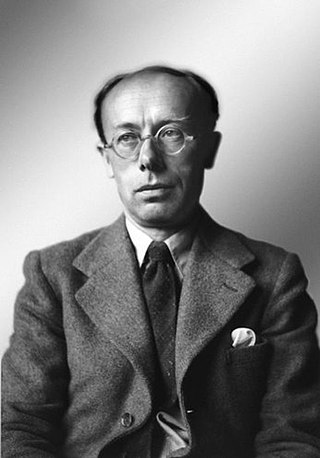
Maxwell Herman Alexander Newman, FRS,, generally known as Max Newman, was a British mathematician and codebreaker. His work in World War II led to the construction of Colossus, the world's first operational, programmable electronic computer, and he established the Royal Society Computing Machine Laboratory at the University of Manchester, which produced the world's first working, stored-program electronic computer in 1948, the Manchester Baby.
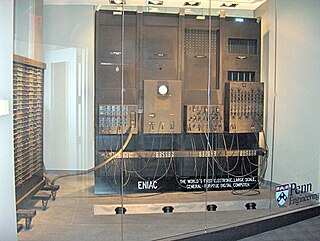
ENIAC was the first programmable, electronic, general-purpose digital computer, completed in 1945. There were other computers that had combinations of these features, but the ENIAC had all of them in one computer. It was Turing-complete and able to solve "a large class of numerical problems" through reprogramming.

Colossus: The Forbin Project is a 1970 American science-fiction thriller film from Universal Pictures, produced by Stanley Chase, directed by Joseph Sargent, that stars Eric Braeden, Susan Clark, Gordon Pinsent, and William Schallert. It is based upon the 1966 science-fiction novel Colossus by Dennis Feltham Jones.

The Manchester Baby, also called the Small-Scale Experimental Machine (SSEM), was the first electronic stored-program computer. It was built at the University of Manchester by Frederic C. Williams, Tom Kilburn, and Geoff Tootill, and ran its first program on 21 June 1948.

Thomas Harold Flowers MBE was an English engineer with the British General Post Office. During World War II, Flowers designed and built Colossus, the world's first programmable electronic computer, to help decipher encrypted German messages.
John Roberts Opel was a U.S. computer businessman. He served eleven years as the president of IBM between 1974 and 1985. He was the chief executive officer (CEO) of IBM from 1981 to 1985, and the chairman of the board of directors from 1983 to 1986.

The Automatic Computing Engine (ACE) was a British early electronic serial stored-program computer design by Alan Turing. Turing completed the ambitious design in late 1945, having had experience in the years prior with the secret Colossus computer at Bletchley Park.
Brian Randell DSc FBCS FLSW is a British computer scientist, and emeritus professor at the School of Computing, Newcastle University, United Kingdom. He specialises in research into software fault tolerance and dependability, and is a noted authority on the early pre-1950 history of computing hardware.
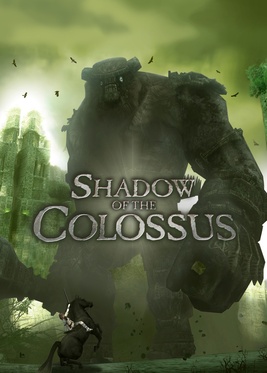
Shadow of the Colossus is a 2005 action-adventure game developed by Japan Studio and Team Ico, and published by Sony Computer Entertainment for the PlayStation 2. It takes place in a fantasy setting and follows Wander, a young man who enters an isolated and abandoned region of the realm seeking the power to revive a girl named Mono. The player assumes the role of Wander as he embarks on a mission that might entail Mono's resurrection: to locate and destroy the colossi, sixteen massive beings spread across the forbidden land, which the protagonist traverses by horseback and on foot.

The Post Office Research Station was first established as a separate section of the General Post Office in 1909.
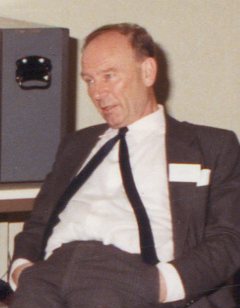
Donald Michie was a British researcher in artificial intelligence. During World War II, Michie worked for the Government Code and Cypher School at Bletchley Park, contributing to the effort to solve "Tunny", a German teleprinter cipher.

A computer is a machine that can be programmed to carry out sequences of arithmetic or logical operations (computation) automatically. Modern digital electronic computers can perform generic sets of operations known as programs. These programs enable computers to perform a wide range of tasks. A computer system is a nominally complete computer that includes the hardware, operating system, and peripheral equipment needed and used for full operation. This term may also refer to a group of computers that are linked and function together, such as a computer network or computer cluster.
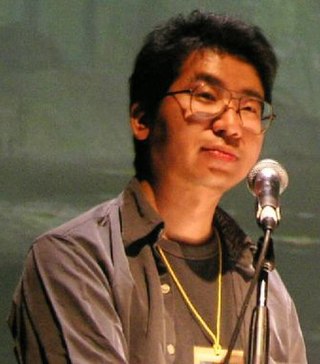
Kenji Kaido is the producer of Sony Interactive Entertainment's Product Development Department #1 division.
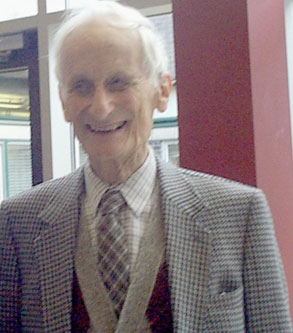
Shaun Wylie was a British mathematician and World War II codebreaker.

Anthony Edgar "Tony" Sale, FBCS was a British electronic engineer, computer programmer, computer hardware engineer, and historian of computing. He led the construction of a fully functional Mark 2 Colossus computer between 1993 and 2008. The rebuild is exhibited at The National Museum of Computing at Bletchley Park in England.

The Ico & Shadow of the Colossus Collection is a video game bundle that contains high-definition remasters of two PlayStation 2 games, Ico and Shadow of the Colossus, for the PlayStation 3. Developed by Bluepoint Games, who assisted in the remastering alongside Japan Studio and its division Team Ico, the bundle provides support for high-definition monitors, higher frame rates, stereoscopic 3D, and additional features for the PlayStation Network. The two games, while fundamentally different in gameplay and story, are thematically connected, with Shadow of the Colossus considered a spiritual sequel to Ico. Both games were critically acclaimed on their original release, while the remastered collection itself was praised by reviewers.

Harry William Fensom was an English electronic engineer with the GPO. During World War II he worked with Tommy Flowers at Bletchley Park on Colossus, the world's first electronic computer, that helped to decode encrypted German messages using the Lorenz cipher. After the war, he designed ERNIE, a machine based on Colossus engineering that was used to generate bond numbers for the Premium Bond draw.
Matt Arnold is an American baseball executive He was Born Jan 1979. who is the general manager of the Milwaukee Brewers of Major League Baseball.
















